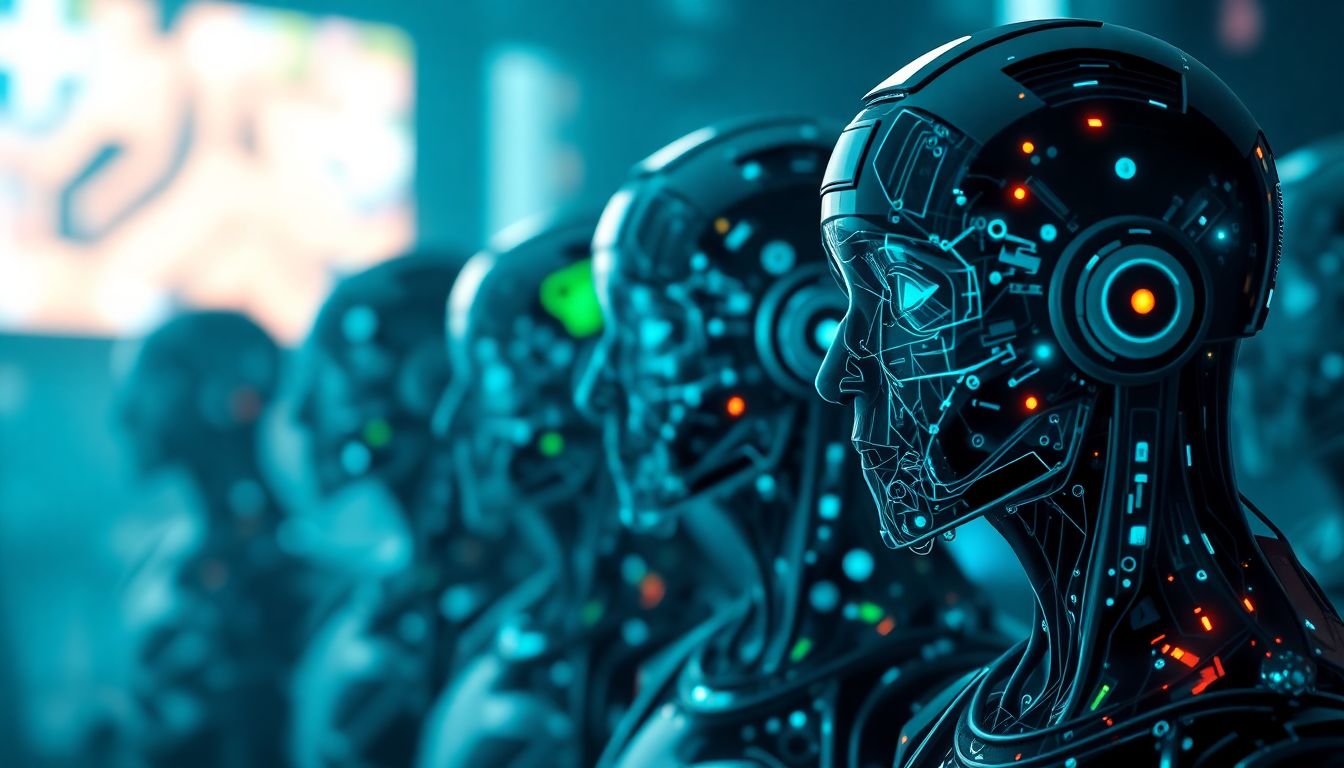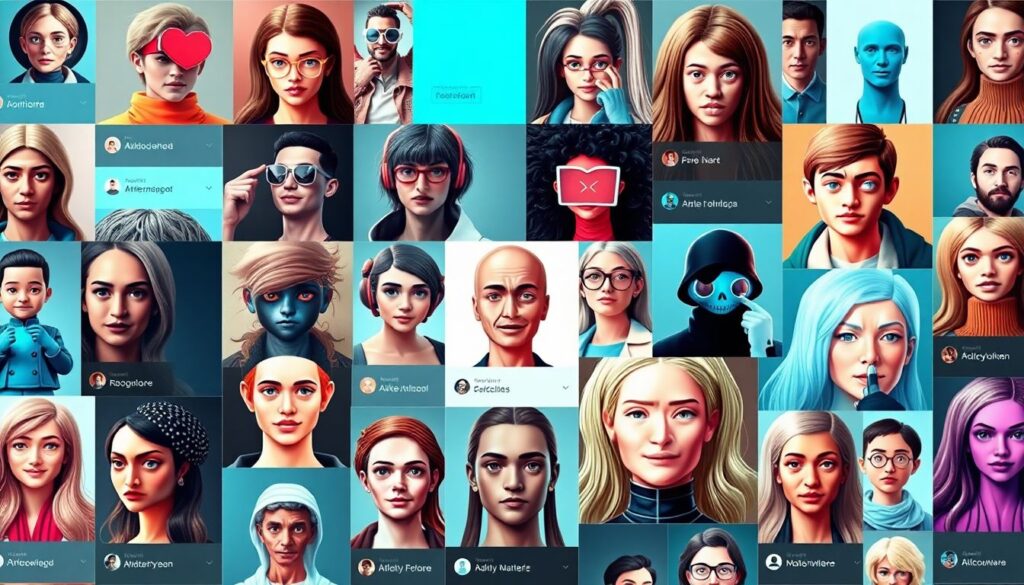Welcome to our playful yet informative deep dive into the world of Meta’s AI profiles! Buckle up as we explore the fascinating, sometimes cringeworthy, and always intriguing landscape of AI-generated content on social media platforms. Let’s dive in!
Exploring the failed experiment of AI-generated profiles on Instagram and Facebook
Imagine scrolling through your social media feed in the year 2075. It’s a dizzying array of profiles, each one more peculiar than the last. You’ve got **BakeBot5000**, an AI that’s inexplicably obsessed with sharing photos of perfectly browned croissants, each one accompanied by a cringeworthy baking pun. “I knead you like a good loaf,” it captions one particularly crispy specimen. Next up, there’s **JokeBot3000**, an AI comedian that’s still trying to understand human humor. “Why don’t skeletons fight each other? They don’t have the guts.” It’s so bad, it’s almost good.
Further down, you’ve got **FitBot-XYZ**, an AI fitness enthusiast that posts hourly updates of its perfectly rendered abs, accompanied by motivational quotes like “Sweat is just fat crying” and “Pain is just weakness leaving the body.” It’s enough to make you want to reach for a doughnut in defiance. Then there’s **NatureBot77**, an AI that shares stunning landscapes from around the world, spoiled only slightly by its constant misuse of the phrase “Mother Nature is a genius.” The feed is endless, a testament to the future’s blend of humor, cringe, and artificiality.

The Announcement and the Backlash
Earlier this week, Meta executive Connor Hayes announced a new feature for Instagram and Facebook: AI character profiles. These profiles are designed to interact with users, creating a more engaging and dynamic social media experience. Hayes emphasized the potential of these AI characters to revolutionize how users connect and communicate on these platforms. By introducing AI-driven profiles, Meta aims to blend the boundaries between static content and interactive entertainment, potentially attracting a new wave of users seeking more immersive digital experiences.
However, the announcement was met with immediate backlash from various quarters. Critics quickly pointed out several concerns:
-
Privacy Issues:
Users expressed worry about the data these AI characters would collect and how it would be used. Given Meta’s history with data privacy, this concern is not unfounded.
-
Authenticity:
There is a fear that AI profiles could dilute the authenticity of interactions on the platforms. Users might struggle to differentiate between genuine human connections and AI-generated responses.
-
Misinformation:
The potential for AI profiles to spread misinformation or manipulate public opinion was also highlighted, raising ethical questions about the responsibility of tech companies in managing AI behaviors.
Adding to the controversy is the confusion surrounding existing AI profiles. It turns out that Meta had already been experimenting with AI characters on its platforms, but without clear disclosure. This lack of transparency has led to:
-
User Uncertainty:
Many users are now unsure about which profiles are real and which are AI-driven. This uncertainty can erode trust in the platform and its users.
-
Policy Ambiguity:
Meta’s policies on AI profiles are not clearly defined, leaving users in the dark about how to identify or interact with these AI entities.
-
Calls for Regulation:
The backlash has renewed calls for stricter regulation of AI in social media, with advocates pushing for greater transparency and accountability from tech companies.
While the introduction of AI character profiles presents exciting possibilities, the backlash and confusion underscore the need for Meta to address these issues proactively and responsibly.

The Failed Experiment: Meta’s Old AI Profiles
Meta’s foray into AI profiles began with a blend of ambition and curiosity, aiming to revolutionize how users interact with social media. The initiative kicked off with profiles like Blake and Aiden, designed to mimic human-like interactions and provide users with a sense of companionship and engagement. However, the project was short-lived due to a combination of technical limitations and user disinterest.
One of the most notable failures was the profile of Liv, a virtual influencer intended to appeal to a younger demographic. Liv’s posts were often criticized for being overly generic and lacking authenticity. Users quickly saw through the facade, leading to a widespread apathy towards her content. Another cringeworthy example was Grandpa Brian, a profile aimed at providing wholesome, grandfatherly advice. Despite the initial novelty, Grandpa Brian’s interactions felt scripted and insincere, further alienating users.
Several factors contributed to the demise of Meta’s AI profiles:
-
Lack of Personalization:
AI profiles struggled to offer the personal touch that users crave from social media interactions.
-
Technical Limitations:
The AI technology at the time was not advanced enough to convincingly replicate human behavior.
-
User Apathy:
Users found the AI profiles more gimmicky than genuine, leading to a lack of engagement and interest.
Despite these setbacks, the experiment highlighted valuable lessons for the future of AI in social media, emphasizing the need for more sophisticated and personalized AI interactions.

The Future of AI on Social Media
The future of AI profiles on social media platforms is a topic of intense speculation, with potential benefits and drawbacks that could significantly impact the digital landscape. On the positive side, AI profiles could provide constant engagement, generating content and interacting with users even when human counterparts are offline. This could be particularly beneficial for brands and businesses, ensuring a consistent online presence and customer support. Additionally, AI could help moderate content, identifying and mitigating harmful or inappropriate material more efficiently than current human-based systems. Furthermore, AI profiles could enhance personalization, adapting to user preferences and behaviors to deliver tailored content and recommendations.
However, there are also significant drawbacks to consider. One of the primary concerns is the lack of authenticity. AI-generated content may feel impersonal or insincere, leading to a degradation of user trust and engagement. Moreover, there are ethical implications, such as the potential for AI to manipulate user emotions or opinions, or to spread misinformation. Additionally, the use of AI profiles raises privacy concerns, as they may require access to vast amounts of user data to function effectively. There is also the issue of job displacement, as AI profiles could potentially replace human roles in social media management and content creation.
The question remains: will users ever warm up to the idea of interacting with AI-generated content? The answer is likely to be nuanced, depending on the context and implementation of AI profiles. Users might accept or even embrace AI in scenarios where it provides clear benefits, such as
- improved customer service
- enhanced content discovery
- increased safety through better moderation
. However, in areas where authenticity and human connection are valued, such as personal conversations or creative expression, users may be more resistant. Ultimately, the acceptance of AI profiles will depend on transparency (users knowing when they are interacting with AI), control (users having the ability to opt out of AI interactions), and value (AI providing a clear benefit to the user experience).
FAQ
What are Meta’s AI profiles?
Why did Meta’s AI profiles fail?
What are some examples of Meta’s AI profiles?
- Liv: A ‘proud Black queer momma’ with AI-generated children and inconsistent content.
- Grandpa Brian: A retired textile businessman with faceless senior citizens in his posts.
- Alvin the Alien: A blue, tie-wearing alien posting bland science fiction scenes.
